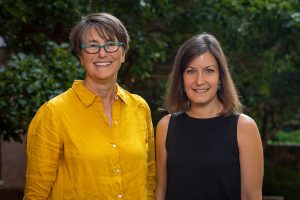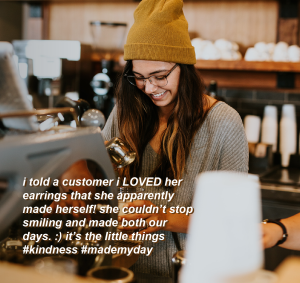Allison Lazard and Barbara Fredrickson are using social media to promote wellness through in-person connection. Their interdisciplinary studies are gaining momentum, with three out of three research proposals receiving funding.

Researchers in the Hussman School of Journalism and Media and College of Arts and Sciences are teaming up to demonstrate that social media can be used to improve your wellbeing. They call their method the “social connectedness intervention,” which utilizes social media to send messages to specific audiences, encouraging them to make in-person connections with other people.
“If you want to influence someone, it’s not what we say, but how it’s presented,” says Allison Lazard, an associate professor within Hussman. “I specialize in how visual and interactive design affects message perception, and if that message inspires action.”
Encouraging people to connect offline in an increasingly online world can be challenging. But Lazard and fellow researcher Barbara Fredrickson decided to use the power of social media to their advantage.
“I study co-experienced positive emotions and the benefits you receive from them,” says Fredrickson, the Kenan Distinguished Professor of Psychology & Neuroscience within the College. “I’ve found that quality, kind-hearted emotional connections are part of staying healthy as much as eating a balanced diet or exercising.”
To create the intervention, the duo will build from Fredrickson’s evidence-based psychology messaging and hone it through collaborations with people from the populations the researchers are trying to reach. Then, the team uses Lazard’s data-driven approach to optimize the message’s design so that it stops scrolling, engages attention, and inspires action.

The intervention is widely applicable, and Lazard and Fredrickson’s research has been substantially supported, most recently with a $3.25 million grant from the National Cancer Institute (NCI) to encourage young adults with cancer to seek social support resources.
The NCI-funded study will focus on reaching people aged 22-39 who have cancer. Because this age group isn’t normally on the lookout for symptoms, they are often diagnosed in the later stages of the disease and have a higher mortality rate compared to younger or older patient populations.
“Young adults have fewer support resources because there are fewer people in this age range with cancer,” says Lazard, a member of the UNC Lineberger Comprehensive Cancer Center. “They’re also in what can be a gray area of life, not completely established, without a strong support network. Friends usually cling to them at first and then fall out of touch.”
To combat loneliness for these young adults with cancer, Lazard and Fredrickson want to encourage them to seek in-person connections by meeting them where they are: social media. The calls to action are small, like paying someone a compliment, and can benefit their mental and physical health.
“Our suggestions will be more effective if we are able to connect with this group with messages that demonstrate understanding of a shared experience,” Lazard says.
But the researchers cannot use actual social media platforms for their studies because those platforms are too uncontrollable. Instead, Lazard, together with co-investigator Nabarun Dasgupta, have created a simulated social media platform that resembles the experience of using Instagram or TikTok.
Preparations for the randomized controlled trial are ongoing. Participants will engage with this platform over four weeks and will encounter 12 different optimized messages. Then, researchers will observe if the messages inspire changes in participants’ social behavior that improve well-being.
Fredrickson and Lazard have secured funding to test the messaging in different forms with different audiences. A $3 million grant from the National Institute on Minority Health and Health Disparities will study whether the intervention can reduce social isolation in young adults ages 18-29. And a $680,000 grant from the Robert Wood Johnson Foundation will support a study using video-based messaging to combat loneliness in young adults with low socioeconomic privilege.
The researchers hope to see their intervention grow beyond their studies and be utilized by various groups aiming to send more effective social support or health care messaging to different populations.
“There’s too great a need for wellbeing support,” Fredrickson says. “We need to encourage people to help themselves in small ways so they can improve their mental health and feel more resilient.”
Allison Lazard is an associate professor within the UNC Hussman School of Journalism and Media and a member of the UNC Lineberger Comprehensive Cancer Center.
Barbara Fredrickson is the Kenan Distinguished Professor of Psychology & Neuroscience within the UNC College of Arts and Sciences.